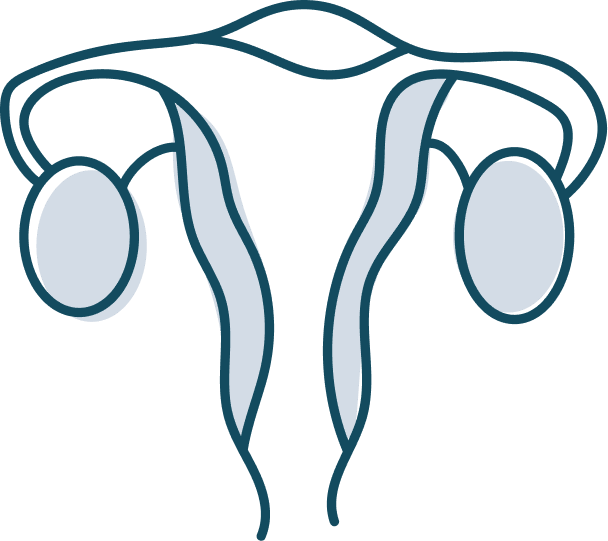Everything you need to know about egg freezing
Words by
Dr Georgina Leslie, Clinical Lead at Bloomful
Updated on
22 Nov 2022
How does egg freezing work?
Egg freezing is when medications are used to stimulate the ovaries so that they can produce several eggs, instead of the normal 1-2 eggs per menstrual cycle. These eggs are then collected, frozen and stored for future baby-making.
As we age, the quantity and quality of our eggs declines, making it more difficult to get pregnant. The chance of a miscarriage also increases with age, especially after we hit 35. Egg freezing is a method that attempts to mitigate these fertility issues.
It’s important to pause here and remember that infertility isn’t something women experience in a vacuum. In fact, in couples experiencing infertility, 50% of the time, the cause is either completely or partly down to the male partner.
OK, so what’s the relationship between egg freezing and IVF?
The only way to use frozen eggs is through IVF (in vitro fertilisation). After the eggs have been thawed, they are fertilised with sperm to create an embryo. The embryo is then inserted back into the uterus to hopefully implant and grow into a pregnancy.
Does egg freezing always work?
According to The Human Fertilisation and Embryology Authority (the organisation that regulates fertility treatment in the UK), egg freezing has an 18% success rate. This is based on how many embryos (developed from frozen eggs) resulted in a live birth in 2017.
While more and more women are freezing their eggs each year, a much smaller number have actually used their eggs to try to get pregnant. This makes for limited data.
The HFEA recommends looking at the IVF success rates in patients who froze their eggs at the same age you intend to do the treatment. For example, if you’re thinking of freezing your eggs when you’re 29, you should look at the success rate of those who froze their eggs when they were 29 (even if you’re planning to use your eggs when you’re 35).

Does it matter how old I am when I freeze my eggs?
The aim with egg freezing is to preserve those younger and better quality eggs. The evidence shows that if eggs are frozen before the age of 35, the chances of success will be higher than the natural conception rate as you get older. This doesn’t mean you can’t freeze your eggs after you’ve blown out 35 candles, it just means that the success rate is lower after 35.
Is egg freezing right for me?
This is an incredibly personal decision and depends on a few factors including your age, family goals, reproductive health and any associated risk factors.
If you’ve spoken to a doctor and there are no known fertility issues/risks, then freezing your eggs isn’t necessary. If you’re planning on having many children from your mid-to-late 30s onwards, then it’s worth looking into egg freezing, as the older you get, the higher your risk of experiencing fertility and pregnancy complications.
It’s worth noting that egg freezing and IVF aren’t without risk themselves. IVF pregnancies and pregnancies when you’re older are generally associated with more complications.
While some people can afford to freeze their eggs as a back-up plan without second thought, most women aren’t in this position. Instead, it’s a case of consulting with a doctor (ideally a fertility expert) who can take all the relevant factors into consideration and tailor their advice to you and your future. This way, you can weigh up how much of a difference freezing your eggs could have and whether it makes sense to invest the considerable amount of money required (more on this below).
How long can eggs be frozen for?
Research has shown that eggs can be preserved indefinitely without deterioration. Thankfully, new legislation has increased the limit of storage from 10 to 55 years.

If I freeze my eggs in my 20s or 30s, what is the oldest I can carry through with a pregnancy?
Legally, there are no limits. Clinics do need to consider whether IVF and pregnancy could harm your health and weigh this up against the chance of a successful treatment. They also need to perform a ‘welfare of the child’ assessment, to determine whether the pregnancy could cause serious physical, psychological or medical harm to any existing children in the family or the child to be born.
Can I freeze my eggs through the NHS?
Egg freezing on the NHS is usually reserved for people with conditions such as cancer, where chemotherapy could affect their fertility.
Patients being considered for egg freezing need to meet a set of criteria. In England, this is decided by the Clinical Commissioning Group in your area. Fertility Network UK helps you navigate NHS funding options for fertility treatments by country:Most people won’t qualify for NHS funding and will need to go through a private clinic.
The cost of freezing your eggs can range between £3,000-5,000 for one cycle. There’s a chance you’ll need to go through more than one cycle to gather enough eggs, so that figure can multiply. Add to that the separate cost of medication and your annual fee for storing the eggs (between £150-400) and the numbers really begin to mount.
You also need to consider future costs for IVF treatment rounds if and when you’re ready to use your eggs. Prices vary from clinic to clinic, but a single cycle of IVF treatment can cost £5,000.
Beware: some clinics might leave out ‘extra’ costs in their quote for egg freezing so make sure you ask them for a full break-down before comparing costs between clinics.
Why does it cost so much?
We feel you.
For one, costs for private fertility treatments aren’t regulated, which means clinics can set their own price. Having said that, the procedure is an intricate one and requires close supervision and multiple visits to the clinic.
For example, while your ovaries are being stimulated to produce egg-containing follicles, your clinic will monitor you closely through blood tests and scans. They do this to track the treatment’s progress and to avoid overstimulation of the ovaries, which can lead to swelling, pain and sometimes hospitalisation.
There are calls for the NHS to make egg freezing more accessible given 21st century culture shifts, including the trend of having children later in life.

What else can I do if I’m not ready to freeze my eggs or can’t afford it?
Lifestyle changes
Age isn’t the only factor that affects fertility. Looking after your body can impact your chances of conceiving in a big way. We all know about the non-negotiables: exercise and nutrition and the must-avoid culprits: smoking, alcohol and recreational drugs.
AMH tests
A much cheaper alternative to egg freezing is a blood test called AMH (Anti Mullerian Hormone). This gives you a snapshot of how many eggs you have left. Tracking your AMH over time can help you understand how quickly or slowly your egg reserve is declining over time. The NHS doesn’t offer fertility investigations unless you’ve been trying for a baby for at least a year, but you can request an AMH test through a private clinic (costs range between £60-300).
Managing gynae conditions
Gynaecological conditions such as pelvic inflammatory disease, polycystic ovarian syndrome, endometriosis and adenomyosis can all impact fertility. They can even impact the success of egg collection and IVF. This is one of the reasons we urge women to investigate period and pelvic symptoms because early diagnosis and treatment can help protect their fertility.
A heavy, irregular or painful period can signal a gynaecological condition so make sure you track your symptoms and speak to a doctor.
Care from the comfort of your home
When was the last time you felt truly heard by a healthcare professional?
At Bloomful, our clinicians listen deeply, ask the right questions, and commit to helping you overcome the health hurdles that are holding you back.
